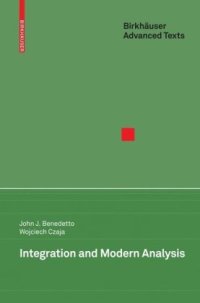
Ebook: Integration and Modern Analysis
- Genre: Mathematics // Analysis
- Tags: Analysis, Functions of a Complex Variable, Measure and Integration
- Series: Birkhäuser Advanced Texts / Basler Lehrbücher
- Year: 2009
- Publisher: Birkhäuser Basel
- City: Boston
- Edition: 1
- Language: English
- pdf
A paean to twentieth century analysis, this modern text has several important themes and key features which set it apart from others on the subject. A major thread throughout is the unifying influence of the concept of absolute continuity on differentiation and integration. This leads to fundamental results such as the Dieudonné–Grothendieck theorem and other intricate developments dealing with weak convergence of measures.
Key Features:
* Fascinating historical commentary interwoven into the exposition;
* Hundreds of problems from routine to challenging;
* Broad mathematical perspectives and material, e.g., in harmonic analysis and probability theory, for independent study projects;
* Two significant appendices on functional analysis and Fourier analysis.
Key Topics:
* In-depth development of measure theory and Lebesgue integration;
* Comprehensive treatment of connection between differentiation and integration, as well as complete proofs of state-of-the-art results;
* Classical real variables and introduction to the role of Cantor sets, later placed in the modern setting of self-similarity and fractals;
* Evolution of the Riesz representation theorem to Radon measures and distribution theory;
* Deep results in modern differentiation theory;
* Systematic development of weak sequential convergence inspired by theorems of Vitali, Nikodym, and Hahn–Saks;
* Thorough treatment of rearrangements and maximal functions;
* The relation between surface measure and Hausforff measure;
* Complete presentation of Besicovich coverings and differentiation of measures.
Integration and Modern Analysis will serve advanced undergraduates and graduate students, as well as professional mathematicians. It may be used in the classroom or self-study.
The subject of real analysis is unified in this modern text by several central concepts, in particular the notion of absolute continuity. Absolute continuity, a major underlying idea in formulating and proving the Fundamental Theorem of Calculus (FTC), the Lebesgue Dominated Convergence Theorem, and the Radon--Nikodym Theorem, is essential in dealing with problems of switching limits and of understanding the amazing inverse relationship between integration and differentiation (FTC). Also, it leads to fundamental notions and results in terms of weak convergence of measures, a topic generally not treated in standard real variable texts. The topics are examined in depth and in a way that is valuable not only from a theoretical point of view, but in a way that presents a sophisticated array of tools with which to deal with a host of difficult practical problems.
Key features: Historical remarks and perspective on the development of real variables. Important role of Vitali, as responsible for many